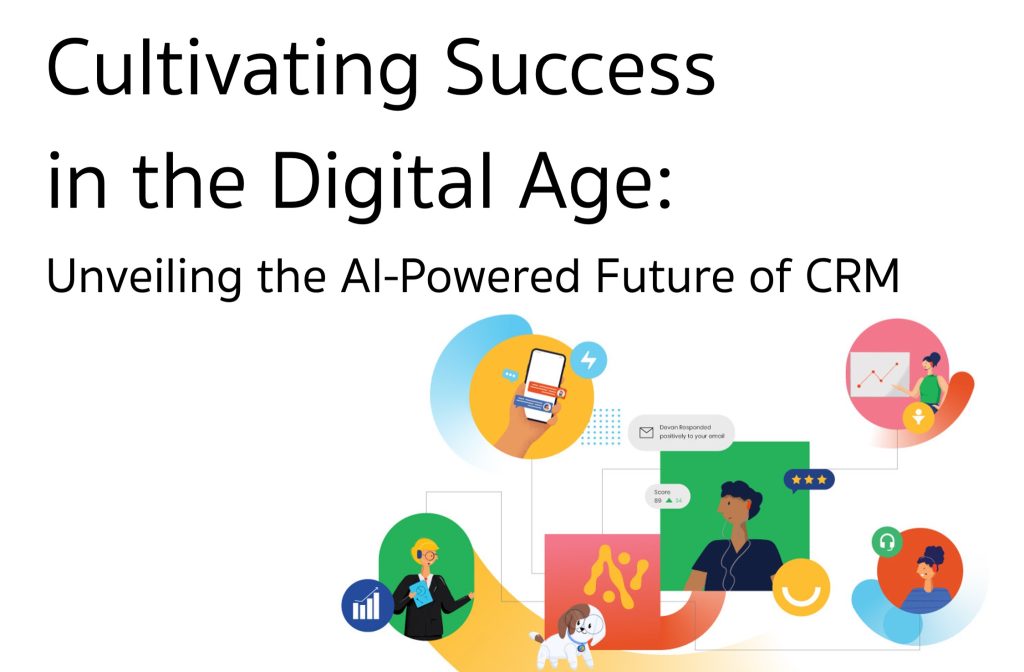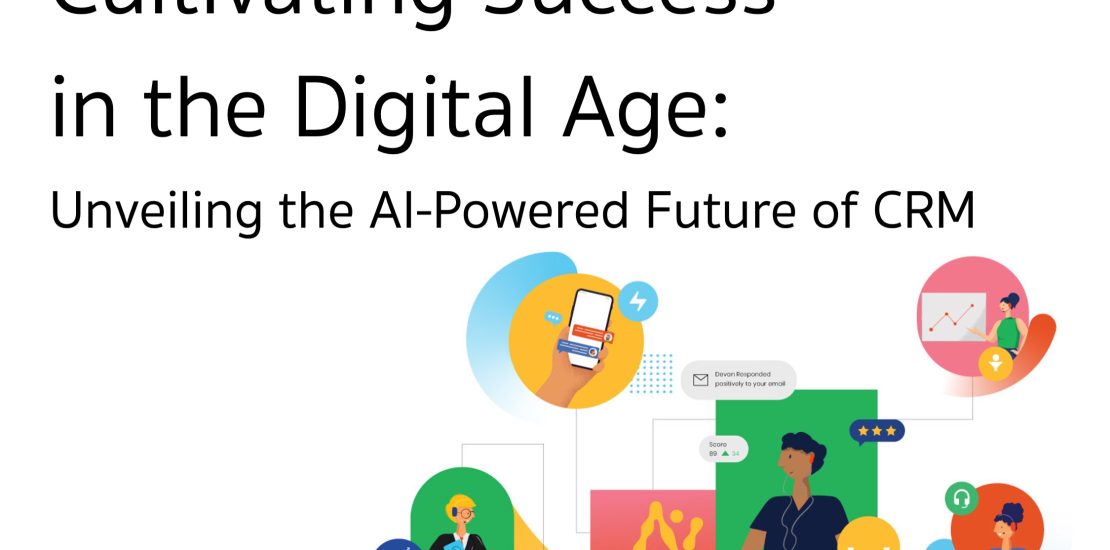Cultivating Success in the Digital Age: Unveiling the AI-Powered Future of CRM

In the fast-paced digital age, customer relationship management (CRM) has become a critical factor in business success. As companies strive to stay competitive and meet the ever-evolving needs of their customers, a new era of CRM powered by artificial intelligence (AI) is emerging. In this article, we explore the exciting possibilities that lie ahead as AI integrates into CRM systems, revolutionizing customer interactions and driving business growth.
With AI-powered CRM, companies can harness the vast amount of data available to gain actionable insights and make informed decisions. From automating repetitive tasks to predicting customer behavior, AI empowers businesses to deliver personalized experiences and build lasting relationships. By analyzing data in real-time, AI-powered CRM systems can provide valuable recommendations and anticipate customer needs, enabling companies to offer tailored solutions and exceed expectations.
As AI continues to evolve and improve, it is evident that the future of CRM lies in its ability to leverage intelligent technologies. Embracing AI-powered CRM can be the catalyst for transforming businesses into customer-centric organizations, driving customer loyalty, and ultimately achieving long-term success in the digital age.
Evolution of CRM in the digital age
In the digital age, customer relationship management (CRM) has become a crucial aspect of business success. Traditional CRM systems have allowed companies to manage customer data, track interactions, and streamline processes. However, with the rapid advancements in technology and the increasing demand for personalized experiences, CRM has had to evolve.
The rise of social media, mobile devices, and e-commerce has generated an immense amount of data. This data explosion presents both challenges and opportunities for businesses. To stay competitive and meet the ever-evolving needs of their customers, companies need to leverage this data effectively. This is where the integration of artificial intelligence (AI) into CRM systems comes into play.
Benefits of AI-powered CRM
AI-powered CRM systems offer a wide range of benefits that can revolutionize customer interactions and drive business growth. One of the key advantages is the ability to automate repetitive tasks. AI algorithms can handle routine customer inquiries, freeing up human agents to focus on more complex and strategic tasks. This not only improves efficiency but also enhances the overall customer experience.
Another significant benefit of AI-powered CRM is the ability to gain actionable insights from vast amounts of data. AI algorithms can analyze customer behavior patterns, identify trends, and predict future actions. This enables businesses to make informed decisions and tailor their offerings to meet specific customer needs. By understanding customer preferences and anticipating their requirements, companies can deliver personalized experiences that foster customer loyalty.
How AI is transforming CRM
AI is transforming CRM by enabling businesses to leverage intelligent technologies to enhance customer interactions and drive better outcomes. One of the ways AI is achieving this is through natural language processing (NLP) and sentiment analysis. NLP allows AI algorithms to understand and respond to customer inquiries in a human-like manner. Sentiment analysis, on the other hand, enables businesses to gauge customer sentiment and address concerns proactively.
Additionally, AI-powered CRM systems can harness machine learning algorithms to predict customer behavior. By analyzing historical data, AI algorithms can identify patterns and make accurate predictions about customers’ future actions. This allows companies to anticipate customer needs and offer tailored solutions, further improving customer satisfaction and loyalty.
Another aspect of AI-powered CRM is the use of chatbots and virtual assistants. These intelligent virtual agents can handle customer inquiries and provide real-time support. They can understand complex queries, provide relevant information, and even initiate follow-up actions. Chatbots and virtual assistants offer round-the-clock support, ensuring that customers’ needs are met promptly and efficiently.
Key features and capabilities of AI-powered CRM
AI-powered CRM systems come with a host of features and capabilities that enhance customer interactions and drive business growth. One of the key features is predictive analytics. By analyzing historical data, AI algorithms can predict customer behavior and identify opportunities for upselling or cross-selling. This allows businesses to optimize their sales strategies and maximize revenue.
Another important capability of AI-powered CRM is sentiment analysis. By analyzing customer interactions, AI algorithms can gauge customer sentiment and detect any dissatisfaction or frustration. This allows businesses to take proactive measures to address concerns and ensure customer satisfaction.
Additionally, AI-powered CRM systems can offer personalized recommendations based on customer preferences and past interactions. By leveraging machine learning algorithms, businesses can provide tailored product or service suggestions, enhancing the overall customer experience and increasing the likelihood of repeat purchases.
Challenges and considerations when adopting AI-powered CRM
While the benefits of AI-powered CRM are compelling, there are also challenges and considerations that businesses need to be aware of when adopting this technology. One of the key challenges is data quality and privacy. AI algorithms rely on clean and accurate data to generate meaningful insights. If the data used is incomplete or biased, it can lead to inaccurate predictions or recommendations.
Additionally, businesses need to ensure that customer data is handled securely and in compliance with privacy regulations.
Another consideration is the potential impact on the workforce. With the automation of repetitive tasks, there may be concerns about job displacement. However, businesses can mitigate this by reskilling employees and reallocating resources to more complex and strategic tasks. AI-powered CRM should be seen as a tool to augment human capabilities rather than replace them.
Furthermore, businesses need to carefully evaluate their AI-powered CRM solution to ensure it aligns with their specific needs and goals. It is essential to choose a solution that integrates seamlessly with existing systems and processes. The solution should also be scalable and adaptable to accommodate future growth and changing business requirements.
Case studies of successful AI-powered CRM implementations
Several companies have successfully implemented AI-powered CRM systems, reaping significant benefits in terms of customer interactions and business growth. One such example is Freshworks, a leading CRM provider. Freshworks leverages AI through its FreddyAI platform, which offers a range of AI-powered features, including predictive analytics, sentiment analysis, and personalized recommendations. By integrating AI into its CRM solution, Freshworks has enabled businesses to drive better customer engagements and achieve higher customer satisfaction.
Another notable case study is Amazon. The e-commerce giant utilizes AI-powered CRM to provide personalized product recommendations to its customers. By analyzing customer browsing and purchase history, Amazon’s recommendation engine suggests relevant products, increasing the likelihood of customer conversions. This personalized approach has contributed to Amazon’s success as a customer-centric organization.
Choosing the right AI-powered CRM solution for your business
When selecting an AI-powered CRM solution for your business, it is crucial to consider several factors. Firstly, assess your specific needs and goals. Identify the pain points in your current CRM system and determine how AI can address them. Additionally, consider the scalability and adaptability of the solution to ensure it can accommodate future growth and changing business requirements.
Another important consideration is the integration capabilities of the solution. Ensure that the AI-powered CRM can seamlessly integrate with your existing systems and processes. This will enable a smooth transition and minimize disruption to your operations.
It is also advisable to evaluate the vendor’s track record and reputation. Look for customer testimonials and case studies to gauge the effectiveness of their AI-powered CRM solution. Additionally, consider the level of support and training provided by the vendor to ensure a successful implementation and adoption of the system.
Conclusion: Embracing the AI-powered future of CRM
In conclusion, the integration of AI into CRM systems is revolutionizing customer interactions and driving business growth. AI-powered CRM enables businesses to automate repetitive tasks, gain actionable insights from vast amounts of data, and deliver personalized experiences that foster customer loyalty. However, businesses need to be aware of the challenges and considerations when adopting AI-powered CRM, such as data quality, privacy, and workforce impact. By carefully evaluating their needs and goals and selecting the right solution, businesses can embrace the AI-powered future of CRM and cultivate success in the digital age.
More information about Freshworks, please contact:
Sundae Solutions Co., Ltd.
T| +6626348899 E| sales@sundae.co.th
W| https://www.sundae.co.th/en/solutions/crm-and-customer-experience/freshworks/
- April 30, 2024
- Posted by: sundaeadmin
- Category: Articles-EN


